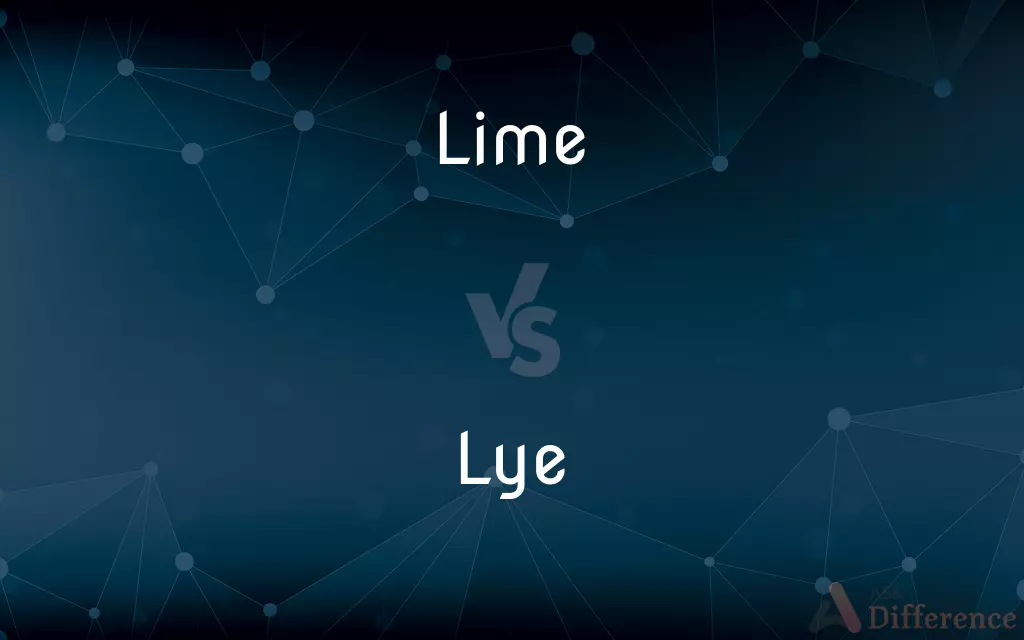Lime vs. Lye — What's the Difference?
By Tayyaba Rehman — Updated on August 17, 2023
Lime refers to calcium-based compounds, commonly used in agriculture and construction. Lye is sodium or potassium hydroxide, primarily used in soap making and food preparation.

Difference Between Lime and Lye
Table of Contents
ADVERTISEMENT
Key Differences
Lime, also known as calcium carbonate, is a naturally occurring substance predominantly used in construction and agriculture. On the other hand, lye is a caustic alkaline substance, formally known as sodium hydroxide, widely used in soap-making, food preparation, and various industrial processes.
Tayyaba Rehman
Jul 25, 2023
Lime is composed of calcium, carbon, and oxygen atoms arranged in a particular crystalline structure. Lye, conversely, is a compound made up of sodium, oxygen, and hydrogen, known for its strong alkaline properties.
Tayyaba Rehman
Jul 25, 2023
Lime, due to its pH-regulating properties, is used in agriculture to treat acidic soils. Lye, with its strong base property, is used for saponification - the process of making soap, curing certain foods, and various cleaning applications.
Tayyaba Rehman
Jul 25, 2023
Lye is extremely corrosive and can cause serious burns or even blindness if it comes into contact with the skin or eyes. Lime, although less immediately dangerous, can still cause irritation and discomfort, especially in powdered form when inhaled or contacted with the skin.
Tayyaba Rehman
Jul 25, 2023
Comparison Chart
Definition
A calcium-containing inorganic mineral
A metal hydroxide traditionally obtained by leaching ashes
Tayyaba Rehman
Jul 25, 2023
ADVERTISEMENT
Chemical Composition
Calcium carbonate or calcium oxide
Sodium hydroxide or potassium hydroxide
Tayyaba Rehman
Jul 25, 2023
Uses
Agriculture, building materials, cooking (lime juice), beverage flavoring
Soap making, cleaning, food preparation (such as in pretzel making)
Tayyaba Rehman
Jul 25, 2023
Safety
Generally safe, but excessive amounts in diet can have side effects
Can be highly caustic and dangerous if not handled properly
Tayyaba Rehman
Jul 25, 2023
Physical State
Solid (can be turned into slurry when water added)
Solid (usually in form of white pellets or flakes)
Tayyaba Rehman
Jul 25, 2023
ADVERTISEMENT
Effect on pH
Increases pH (makes a solution more basic)
Increases pH (makes a solution more basic)
Tayyaba Rehman
Jul 25, 2023
Main Hazards
Skin and eye irritation from dust
Severe skin burns, eye damage, inhalation can cause respiratory problems
Tayyaba Rehman
Jul 25, 2023
Definitions
Lime
A type of calcium-containing inorganic material often used in building and industrial processes.
The old cathedral was built using lime and stone, giving it a unique texture and color.
Tayyaba Rehman
Jul 25, 2023
Lye
A strong alkaline solution, often sodium hydroxide, used in soap making.
She cautiously added lye into the mixture, mindful of its caustic nature in the soap-making process.
Tayyaba Rehman
Jul 26, 2023
Lime
A term in British English for a linden tree or its wood.
We sought shade under the large lime on a hot summer's day.
Tayyaba Rehman
Jul 25, 2023
Lye
A component in some hair relaxers used to alter the hair's texture.
Carefully applying the lye, she changed her hair from tightly coiled to straight.
Tayyaba Rehman
Jul 26, 2023
Lime
A green, citrus fruit known for its acidic juice.
She squeezed a fresh lime into her water to add a refreshing citrus flavor.
Tayyaba Rehman
Jul 25, 2023
Lye
A key ingredient in certain types of homemade soap for its saponification properties.
He gently stirred the lye into the oil, taking the first step in his homemade soap project.
Tayyaba Rehman
Jul 26, 2023
Lime
Any of several evergreen trees or shrubs of the genus Citrus having edible green or greenish-yellow fruit, especially the Mexican lime and the Persian lime.
Tayyaba Rehman
May 23, 2018
Lime
A tropical evergreen tree that produces the lime fruit.
The lime trees in our backyard give us a constant supply of limes during the summer months.
Tayyaba Rehman
Jul 25, 2023
Lye
A substance historically used in food preparation to enhance certain flavors and textures.
She used a touch of lye to give the pretzels their traditional taste and texture.
Tayyaba Rehman
Jul 26, 2023
Lime
A rounded citrus fruit similar to a lemon but greener, smaller, and with a distinctive acid flavour.
Wedges of lime
Lime juice
Roughly chop two limes
Tayyaba Rehman
May 23, 2018
Lye
A chemical compound used in paper production to break down wood fibers.
The lye solution effectively broke down the wood fibers, accelerating the paper-making process.
Tayyaba Rehman
Jul 26, 2023
Lye
A chemical agent used in textile industries to process and treat fabrics.
They soaked the fabric in a lye solution to prepare it for the dyeing process.
Tayyaba Rehman
Jul 26, 2023
Lye
A caustic substance used in certain industrial processes, such as metal cleaning.
He used lye to clean the machine parts, removing the stubborn grime and rust.
Tayyaba Rehman
Jul 26, 2023
Lime
To entangle; to insnare.
We had limed ourselves with open eyes, and we must take the chance.
Tayyaba Rehman
May 23, 2018
Lye
A lye is a metal hydroxide traditionally obtained by leaching wood ashes, or a strong alkali which is highly soluble in water producing caustic basic solutions. "Lye" most commonly refers to sodium hydroxide (NaOH), but historically has been used for potassium hydroxide (KOH).
Tayyaba Rehman
May 23, 2018
Lime
A white caustic alkaline substance consisting of calcium oxide, which is obtained by heating limestone and which combines with water with the production of much heat; quicklime.
Tayyaba Rehman
May 23, 2018
Lye
A strongly alkaline solution, especially of potassium hydroxide, used for washing or cleansing.
Tayyaba Rehman
May 23, 2018
Lime
An informal social gathering characterized by semi-ritualized talking.
Tayyaba Rehman
May 23, 2018
Lime
Sit or stand around talking with others.
Boys and girls were liming along the roadside as if they didn't have anything to do.
Tayyaba Rehman
May 23, 2018
Lime
To hang out/socialize in an informal, relaxed environment, especially with friends, for example at a party or on the beach.
Tayyaba Rehman
May 23, 2018
Lye
A strong caustic alkaline solution of potassium salts, obtained by leaching wood ashes. It is much used in making soap, etc.
Tayyaba Rehman
May 23, 2018
Lye
Sodium hydroxide or potassium hydroxide, or a concentrated aqueous solution of either compound.
Tayyaba Rehman
May 23, 2018
Lye
A cleaning agent used for various purposes, including unclogging drains.
After fruitless plunging, he finally resorted to lye to unblock the stubborn drain.
Tayyaba Rehman
Jul 26, 2023
Lye
A basic compound often used in chemical experiments and teaching.
In chemistry class, we used lye to demonstrate a base's reaction with acids.
Tayyaba Rehman
Jul 26, 2023
Lye
A substance used in the process of biodiesel production to act as a catalyst.
The addition of lye in the process sped up the transformation of vegetable oil into biodiesel.
Tayyaba Rehman
Jul 26, 2023
Lime
A white crystalline oxide used in the production of calcium hydroxide.
Tayyaba Rehman
May 23, 2018
Lime
A sticky adhesive that is smeared on small branches to capture small birds.
Tayyaba Rehman
May 23, 2018
Lime
Any of various deciduous trees of the genus Tilia with heart-shaped leaves and drooping cymose clusters of yellowish often fragrant flowers; several yield valuable timber.
Tayyaba Rehman
May 23, 2018
Lime
A bright shade of green, similar to that of the lime fruit.
He painted his room lime to bring a sense of freshness and vibrancy.
Tayyaba Rehman
Jul 25, 2023
Lime
The evergreen citrus tree which produces limes, widely cultivated in warm climates.
Tayyaba Rehman
May 23, 2018
Lime
A deciduous tree with heart-shaped leaves and fragrant yellowish blossom, native to north temperate regions. The pale timber is used for carving and inexpensive furniture.
Tayyaba Rehman
May 23, 2018
Lime
Treat (soil or water) with lime to reduce acidity and improve fertility or oxygen levels.
They were liming acidified lakes.
Tayyaba Rehman
May 23, 2018
Lime
The fruit of any of these plants, having a pulpy interior and usually acid juice.
Tayyaba Rehman
May 23, 2018
Lime
Any of various mineral and industrial forms of calcium oxide differing chiefly in water content and percentage of constituents such as magnesia, silica, alumina, and iron.
Tayyaba Rehman
May 23, 2018
Lime
(chemistry) Any inorganic material containing calcium, usually calcium oxide (quicklime) or calcium hydroxide (slaked lime).
Tayyaba Rehman
May 23, 2018
Lime
(poetic) Any gluey or adhesive substance; something which traps or captures someone; sometimes a synonym for birdlime.
Tayyaba Rehman
May 23, 2018
Lime
A deciduous tree of the genus Tilia, especially Tilia × europaea; the linden tree.
Tayyaba Rehman
May 23, 2018
Lime
Any of several green citrus fruit, somewhat smaller and sharper-tasting than a lemon.
Tayyaba Rehman
May 23, 2018
Lime
Any of the trees that bear limes, especially Key lime, Citrus aurantiifolia.
Tayyaba Rehman
May 23, 2018
Lime
(uncountable) A brilliant, sometimes yellowish, green colour associated with the fruits of a lime tree.
Tayyaba Rehman
May 23, 2018
Lime
The fruit of the Citrus aurantifolia, allied to the lemon, but greener in color; also, the tree which bears it.
Tayyaba Rehman
May 23, 2018
Lime
Oxide of calcium, CaO; the white or gray, caustic substance, usually called quicklime, obtained by calcining limestone or shells, the heat driving off carbon dioxide and leaving lime. It develops great heat when treated with water, forming slaked lime, and is an essential ingredient of cement, plastering, mortar, etc.
Tayyaba Rehman
May 23, 2018
Lime
To smear with a viscous substance, as birdlime.
These twigs, in time, will come to be limed.
Tayyaba Rehman
May 23, 2018
Lime
To treat with lime, or oxide or hydrate of calcium; to manure with lime; as, to lime hides for removing the hair; to lime sails in order to whiten them; to lime the lawn to decrease acidity of the soil.
Land may be improved by draining, marling, and liming.
Tayyaba Rehman
May 23, 2018
FAQs
Is Lime water the same as lye water?
No, lime water and lye water are not the same. Lime water is a dilute solution of calcium hydroxide, while lye water refers to a solution of sodium hydroxide or potassium hydroxide.
Tayyaba Rehman
Jul 26, 2023
Is lye harmful to humans?
Yes, lye is harmful to humans. Its highly corrosive nature can cause burns, and, if ingested or inhaled, can lead to serious internal injuries or death.
Tayyaba Rehman
Jul 26, 2023
Is chuna hydrated lime?
Yes, chuna is another name for hydrated lime or calcium hydroxide.
Tayyaba Rehman
Jul 26, 2023
Is lye used in cement?
While not typically a primary ingredient, lye or sodium hydroxide can be used in some cement and concrete mixtures to alter certain properties, such as setting time.
Tayyaba Rehman
Jul 26, 2023
Is lye in baking soda?
No, lye is not in baking soda. Lye is sodium hydroxide or potassium hydroxide, while baking soda is sodium bicarbonate.
Tayyaba Rehman
Jul 26, 2023
Can we drink lime water?
Lime water referring to water infused with lime fruit, is safe to drink and is often consumed for its refreshing flavor and potential health benefits. However, lime water in the context of a calcium hydroxide solution is not safe to drink as it's used in construction and industrial applications.
Tayyaba Rehman
Jul 26, 2023
What is the source of lime?
The primary source of lime is limestone, a sedimentary rock composed mainly of skeletal fragments of marine organisms such as coral and shells.
Tayyaba Rehman
Jul 26, 2023
What is lye water called?
Lye water is often referred to as a caustic solution or alkaline solution. The specific name depends on the type of lye: a solution of sodium hydroxide is sometimes called soda lye, while a solution of potassium hydroxide can be called potash lye.
Tayyaba Rehman
Jul 26, 2023
Is lye a good fertilizer?
No, lye is not a good fertilizer. Its highly alkaline nature can harm plants and disrupt soil biology.
Tayyaba Rehman
Jul 26, 2023
What are 5 uses for lime?
Uses for lime include soil amendment in agriculture, pH adjustment in water treatment, ingredient in construction materials like mortar and plaster, ingredient in industrial processes such as steel manufacturing, and in food preparation as a pH regulator.
Tayyaba Rehman
Jul 26, 2023
What is the main ingredient of lime concrete?
The main ingredient of lime concrete is lime, often in the form of hydrated lime or quicklime. Other ingredients include sand and water.
Tayyaba Rehman
Jul 26, 2023
What chemicals make lime?
Lime, or calcium oxide, is produced from limestone, or calcium carbonate, through a process called calcination, which involves heating the limestone at high temperatures in a lime kiln.
Tayyaba Rehman
Jul 26, 2023
What is lime used for?
Lime is used in various applications, including construction, agriculture, water treatment, and industrial manufacturing processes. In construction, it's used in mortar and plaster. In agriculture, it's used to neutralize acidic soil. In water treatment, it aids in purification and pH regulation.
Tayyaba Rehman
Jul 26, 2023
What is the pH of lye?
Lye is highly alkaline, with a pH value typically above 13.
Tayyaba Rehman
Jul 26, 2023
Is lye a chlorine?
No, lye is not chlorine. It is an alkaline substance composed of either sodium hydroxide or potassium hydroxide.
Tayyaba Rehman
Jul 26, 2023
What foods contain lye?
Lye is used to prepare certain foods, including pretzels, lye rolls, and some types of mooncakes. In these applications, it contributes to the browning effect and unique flavor of these foods.
Tayyaba Rehman
Jul 26, 2023
Is lime acidic or basic?
Lime, in the form of calcium oxide or calcium hydroxide, is basic or alkaline.
Tayyaba Rehman
Jul 26, 2023
Is lime plaster strong?
While lime plaster is not as strong or hard as cement plaster, it is flexible and less prone to cracking. It is also breathable, allowing moisture to escape from the structure.
Tayyaba Rehman
Jul 26, 2023
Is lye or lime in concrete?
Both lye and lime can be present in concrete. Lime (calcium hydroxide) is a key ingredient in cement manufacture, which is used in concrete. Lye (sodium hydroxide), while not a traditional ingredient, can sometimes be used in certain concrete mixtures.
Tayyaba Rehman
Jul 26, 2023
What is lye used for in farming?
In farming, lye is used for making soap and detergents that are useful in cleaning farm equipment and structures. However, it is not typically used directly on plants or soil due to its high pH and corrosiveness.
Tayyaba Rehman
Jul 26, 2023
Does lime make cement stronger?
Lime doesn't necessarily make cement stronger, but it helps make it more workable and pliable. Lime increases cement's plasticity and makes it easier to spread and work with.
Tayyaba Rehman
Jul 26, 2023
Which is stronger cement or lime?
Cement is stronger than lime. Lime is often used in conjunction with cement for its workability and plasticity but it's the cement that provides strength and durability to the construction.
Tayyaba Rehman
Jul 26, 2023
Why do farmers use lime?
Farmers use lime to correct acidic soil conditions. Lime neutralizes acidity, improving soil health and nutrient availability, which enhances crop yield.
Tayyaba Rehman
Jul 26, 2023
How is lye made?
Lye is traditionally made through the process of leaching wood ashes with water to produce a strong alkali solution. Commercially, it is produced by electrolysis of sodium chloride solution.
Tayyaba Rehman
Jul 26, 2023
Is lye an acid or base?
Lye, which is either sodium hydroxide or potassium hydroxide, is a base.
Tayyaba Rehman
Jul 26, 2023
What is the best substitute for lye?
Baking soda is often considered the best substitute for lye in many applications, especially in cooking, due to its alkaline properties, although it is less potent.
Tayyaba Rehman
Jul 26, 2023
What is the real name for lye?
The chemical name for lye is either sodium hydroxide or potassium hydroxide, depending on its composition.
Tayyaba Rehman
Jul 26, 2023
Is glycerin the same as lye?
No, glycerin and lye are not the same. Glycerin is a natural by-product of the soap-making process, which involves the reaction between lye and fats or oils.
Tayyaba Rehman
Jul 26, 2023
Is lye all natural?
Yes, lye can be considered all-natural, especially when it is produced by leaching water through wood ashes. However, most commercially available lye is produced synthetically.
Tayyaba Rehman
Jul 26, 2023
Is pure lye toxic?
Yes, pure lye is highly toxic and corrosive. It can cause burns on the skin and eyes, and if ingested or inhaled, can cause severe internal injuries.
Tayyaba Rehman
Jul 26, 2023
What is lye in skincare?
In skin care, lye or sodium hydroxide is used in the saponification process to turn oils into soap. It's also used as a pH adjuster in a variety of skincare products.
Tayyaba Rehman
Jul 26, 2023
What is pure lye made of?
Pure lye is composed of either sodium hydroxide or potassium hydroxide.
Tayyaba Rehman
Jul 26, 2023
What is the main chemical in lye?
The main chemical in lye is either sodium hydroxide (NaOH) or potassium hydroxide (KOH).
Tayyaba Rehman
Jul 26, 2023
Why is it called lye?
The term "lye" comes from an old English word, "leag," which means to lie or lay down. This could possibly refer to the traditional process of making lye by leaching or laying down water through wood ashes.
Tayyaba Rehman
Jul 26, 2023
What are other names for lye?
Other names for lye include caustic soda (for sodium hydroxide) and caustic potash (for potassium hydroxide).
Tayyaba Rehman
Jul 26, 2023
What is the pH of lime water?
The pH of lime water (a dilute solution of calcium hydroxide) is typically between 12 and 13, which means it is alkaline.
Tayyaba Rehman
Jul 26, 2023
How many limes a day is safe?
While there's no set number of limes a person should consume daily, a balanced diet suggests one to two servings of citrus fruits per day.
Tayyaba Rehman
Jul 26, 2023
Is lime water good for kidneys?
Drinking lime-infused water may benefit kidney health as citrate in lime can help prevent the formation of kidney stones.
Tayyaba Rehman
Jul 26, 2023
Does lime increase pH?
Yes, adding lime to soil increases the pH, making it more alkaline. This is often done in agriculture to correct acidic soil conditions.
Tayyaba Rehman
Jul 26, 2023
What is the ratio of lime to clay in cement?
The ratio of lime to clay in cement is typically around 2:1. This can vary depending on the specific type of cement being produced.
Tayyaba Rehman
Jul 26, 2023
Is limestone stronger than concrete?
No, concrete is generally stronger and more durable than limestone. Limestone is often used as a raw material in the production of cement, which is a key component of concrete.
Tayyaba Rehman
Jul 26, 2023
Why lime is used in construction?
Lime is used in construction for its beneficial properties, such as flexibility, breathability, and self-healing capability. It is used in mortar, plaster, and some types of concrete.
Tayyaba Rehman
Jul 26, 2023
Which lime is best for construction?
Hydrated lime, also known as slaked lime or calcium hydroxide, is commonly used in construction due to its workability, plasticity, and compatibility with other building materials.
Tayyaba Rehman
Jul 26, 2023
Is lime a raw material of cement?
Yes, lime, in the form of limestone, is a major raw material in the production of cement.
Tayyaba Rehman
Jul 26, 2023
Does lime harden concrete?
Adding lime to concrete can increase its workability and make it easier to place. Over time, lime in concrete reacts with carbon dioxide in the air to harden and become more durable.
Tayyaba Rehman
Jul 26, 2023
Does lime weaken cement?
No, lime does not weaken cement. It can be added to cement mixes to improve workability and plasticity. However, adding too much lime can reduce the overall strength of the cement.
Tayyaba Rehman
Jul 26, 2023
Is chuna lime water?
Yes, chuna is another name for lime, specifically calcium hydroxide. When it is dissolved in water, it is often referred to as lime water.
Tayyaba Rehman
Jul 26, 2023
Author Spotlight

Written by
Tayyaba RehmanTayyaba Rehman is a distinguished writer, currently serving as a primary contributor to askdifference.com. As a researcher in semantics and etymology, Tayyaba's passion for the complexity of languages and their distinctions has found a perfect home on the platform. Tayyaba delves into the intricacies of language, distinguishing between commonly confused words and phrases, thereby providing clarity for readers worldwide.

















































